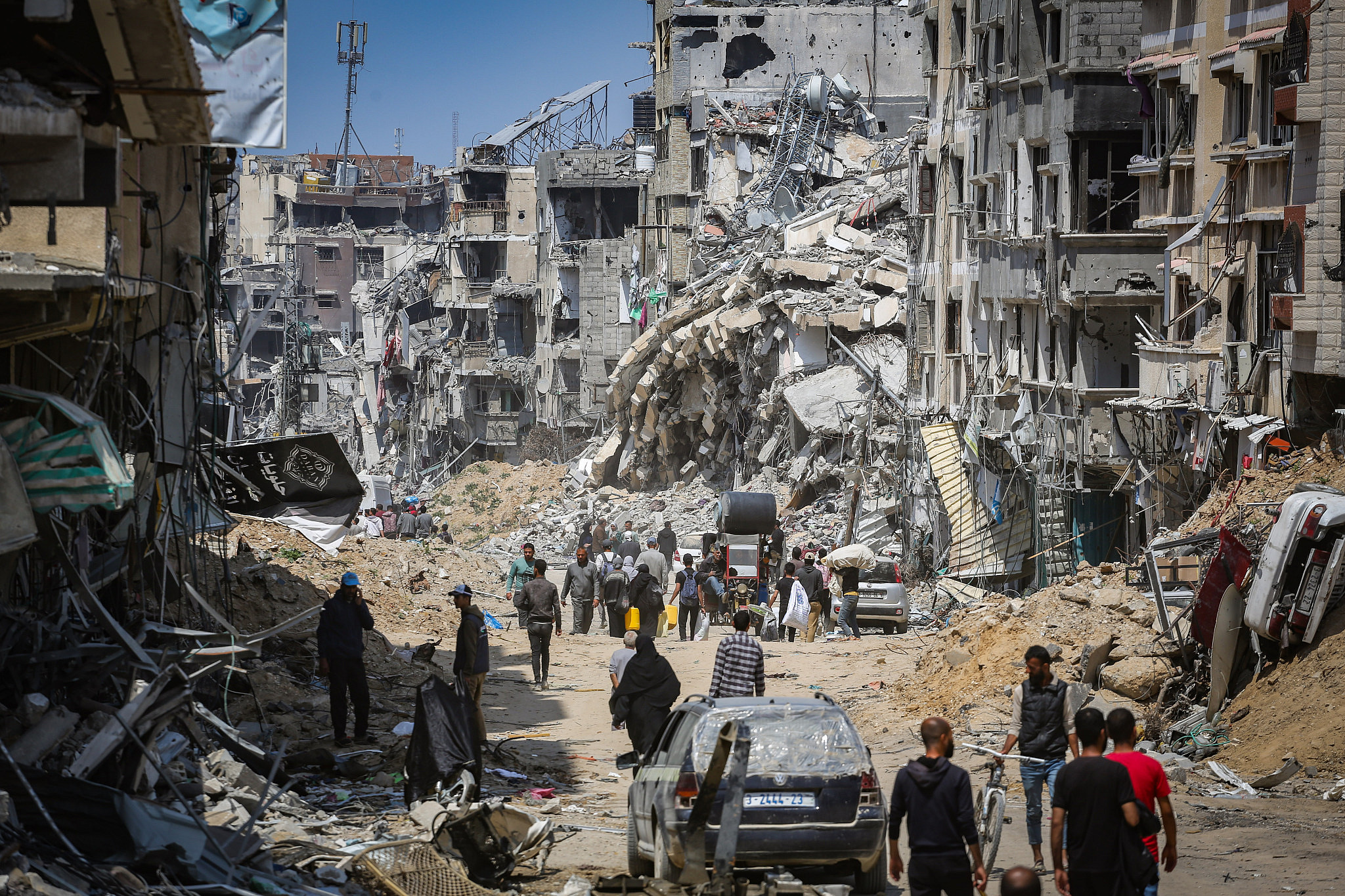Haaretz full article.
How Strategic Relations With Azerbaijan Became the Business of the Lieberman Family
Against the backdrop of Avigdor Lieberman's warm ties with Baku, his sons Amos and Kobi became paid intermediaries between the government of Azerbaijan and Israeli tech companies
At the end of April 2022, then-Finance Minister Avigdor Lieberman embarked on a strange overseas trip. Two months after Russia had invaded Ukraine, Lieberman surprisingly hurried to Azerbaijan. His spokespeople told the media he had flown there in order to close deals for immediate imports of wheat and fuel – goods that were feared to become unavailable globally due to the war. However, that explanation was brought into question when the Israeli press discovered that the finance minister did not even consult with prominent importers of these goods prior to his trip.
To this day, the question of what exactly this cover story was intended to hide remains unresolved. As with so many other events, it faded in the chaos of Israel's public agenda – and was quickly forgotten.
What was missing from the discussion at the time was the deep business relationship that Lieberman's two sons – Amos and Kobi, then 31 and 34 years old, respectively – had developed with the Azerbaijani government. The Lieberman brothers, it turns out, spend a lot of time in Baku, where they are considered intermediaries who know how to open doors to the government.
In recent years, Lieberman's sons have marketed a number of Israeli high-tech products to the government of Azerbaijan: a cyberoffense product made by the cybersecurity company Candiru; a big data system for improving tax collection by another cybersecurity firm, Rayzone; and water desalination technologies by the Israeli company IDE.
The potential commissions from brokering these three ventures alone could reach millions of dollars. Additionally, until recently, the Lieberman brothers represented Azerbaijan Airlines (the national flag carrier controlled by the state) in Israel.
Avigdor Lieberman did not deviate from the practice of other senior ministers who contributed to the warming of relations with Baku: defense ministers Benny Gantz and Yoav Gallant also visited the Azerbaijani capital in recent years, as did Prime Minister Benjamin Netanyahu in 2016 and President Isaac Herzog in 2023.
The main difference between Lieberman and the others is not necessarily about policy. Instead, it relates to the fact that, unlike his children, the progeny of Herzog, Gantz, Netanyahu and Gallant did not do business with the government with which they engaged as representatives of the State of Israel.
The unholy trinity: oil, arms, intelligence
Before asking how the brothers became an intermediary channel used by cyberfirms who have no lack of established connections, it's worth understanding the background to relations between Israel and Azerbaijan, and their father's contribution to those relations.
Azerbaijan is a republic that broke away from the former Soviet Union and gained independence in 1991. The majority of its population is Shi'ite Muslim, yet it has maintained relations with Israel since the first years of its independence and those relations have deepened over time.
The Israel-Azerbaijan relationship relies on an unholy trinity of oil, arms and intelligence. Israel buys oil from Azerbaijan (about half of Israel's crude oil originates there), and
sells it advanced military equipment. In return, Azerbaijan reportedly gives it access to its land and sea border with Israel's number one rival: Iran.
"The fact that Azerbaijan is a neighboring country to Iran with a complex relationship with Tehran is part of the basis for the cooperation between the countries," says Gallia Lindenstrauss, a senior researcher at Tel Aviv University's Institute for National Security Studies.
Azerbaijan's main interest in the relationship with Israel concerns its conflict with Armenia over control of the
Nagorno-Karabakh region, explains Lindenstrauss. In 2023, Azerbaijan achieved a decades-long goal: the occupation of the 4,400-square-kilometer (1,700-square-mile) territory near its eastern border with Armenia, which is at the center of a conflict between the two countries. Some 100,000 Armenians abandoned their homes after the Azerbaijani invasion, which many worldwide saw as an act of ethnic cleansing. This happened after two rounds of fighting between 2020 and 2023, in which Azerbaijan was victorious – thanks in no small part to game-changing weaponry supplied by Israel.
A star of the campaign was a Hermes intelligence drone manufactured by Elbit. An equally significant star was Israel Aerospace Industries' Harop drone, a "suicide drone" that flies quickly toward its target and explodes on it. Massive shipments of Harop drones
helped Azerbaijan eradicate a significant portion of the Armenian armored corps in Nagorno-Karabakh and also, according to the Armenians, quite a few innocent civilians.
As Itai Anghel and Eddie Gerald expertly documented on the Israeli TV show "Uvda" ("Fact") in 2021, these drones were showcased in the victory parade held in Baku by Azerbaijani President Ilham Aliyev during the first phase of the military campaign. Azerbaijan purchased some of these drones during Lieberman's term as defense minister in 2016-2018.
Lieberman has
visited Azerbaijan more times than any other leading Israeli politician. Between 2010 and 2014, when he served as foreign minister, he visited the West Asian republic three times. In each of the meetings, he was received by President Aliyev himself. At the height of that period, the Israeli leadership was still reportedly considering airstrikes on Iranian nuclear facilities. This was also the period when news about the massive Azerbaijani purchase of drones from Israel began to be published in foreign media.
The Israeli stand at the Paris Air Show displaying the Harop drone.Credit: Remy de la Mauviniere / AP
During his visit to the country in 2012, Lieberman was asked to address a Foreign Policy story that examined relations between the two countries. In the article, a senior U.S. administration official was quoted as saying that "the Israelis have bought
an airfield, and the airfield is called Azerbaijan," The names of several former Soviet air force bases were mentioned that, according to the magazine's sources, were or would be placed at Israel's disposal in anticipation of a possible airstrike.
Journalists in Baku asked Lieberman about the issue. He responded that it was "science fiction" and "James Bond stories that have no connection to reality." Foreign Policy continued to stand behind its story, though. Since then, further information has been published in foreign media such as The Times of London, including the claim that Israeli espionage agency Mossad has a base in Azerbaijan.
In the following years, Lieberman left the Foreign Ministry, and later the government altogether, but continued to act as a
friend of the Azerbaijanis. By any standard, Azerbaijan is a dictatorship. In the latest democracy index published by the Economist Intelligence Unit in 2023, it was ranked 130th out of 167 countries and autonomous territories whose level of democracy was measured by 60 parameters. For comparison's sake, Israel was 30th. According to the index, monarchies such as Morocco, Jordan, the United Arab Emirates and Kuwait are ranked as more democratic than Azerbaijan.
Aliyev assumed office for the first time in 2003, in a process that appeared to be democratic elections. His predecessor was his father, Heydar Aliyev, a former KGB operative who seized the presidency in a military coup that took place at Azerbaijan's first years as an independent nation a decade earlier.
Over the years, the ruling family has invested considerable efforts to improve its despotic image in the world. Its modern and gleaming capital, built on oil money, is marketed as a bastion of progress and technology, and hosts many international conferences and exhibitions. Significant funds have been lavished in recent decades on hiring lobbyists and communications consultants in Western capitals for the sake of image-polishing.
In 2015, a group of Israeli lawmakers joined the effort. Amid allegations of irregularities in the presidential elections that took place two years earlier, which resulted in Aliyev's victory with an eyebrow-raising 85 percent of the vote, a delegation of four Knesset members led by Lieberman was sent from Israel to "oversee" the integrity of the parliamentary elections and provide them with a democratic and proper appearance. Along with former MK Sofa Landver from his own Yisrael Beiteinu party, and then-MKs Yoel Razvozov (Yesh Atid) and Michael Oren (Kulanu), the Israeli delegation provided the expected legitimization with its stamp of being "the only democracy in the Middle East."
The election process concluded as expected with another victory for Aliyev's New Azerbaijan party. Lieberman and his colleagues found it to be faultless. The result of the oversight was anticipated in advance, as Lieberman had publicly declared what he would find even prior to the elections: "The Azerbaijani people will make their choice, and the result of the elections will be a good lesson for some forces who, unjustly, criticize Azerbaijan," Lieberman was quoted as saying on the Ynet website.
Furthermore, after the country's most recent elections at the beginning of 2024, when Aliyev won by even bigger majority that cast the process in a ludicrous light, Lieberman sent a letter of congratulations to the dictator: "More than 92 percent of voters chose you to continue to lead the country forward, toward progress and growth," he wrote.
Alarm doesn't go off: cybertech added to arms deals
In 2016, the Israeli-Azerbaijani romance was clouded by a distressing affair: Israeli-Russian blogger Alexander Lapshin was arrested at Minsk airport after the authorities in Azerbaijan asked the Belarusians to arrest and extradite him. The blogger's "crimes" consisted of two visits to Nagorno-Karabakh – contrary to Azerbaijani law – from where he wrote articles that were not to the satisfaction of the Aliyev regime.
In 2017, Lapshin was extradited to Baku, where he was sentenced to three years in prison. A few months later, though, an incident occurred for which he was hospitalized: An official spokesman for the Azerbaijani government claimed Lapshin had tried to commit suicide, while the prisoner himself later said he had been attacked by Azerbaijani security personnel who, he alleged, tried to kill him. Eventually, Aliyev
pardoned him and the blogger returned to Israel.
"The family sent endless requests to Israeli officials, including then-Defense Minister Lieberman, to help in the matter. But as far as I know, he did not lift a finger," says former MK Ksenia Svetlova, who assisted the family in securing
Lapshin's freedom. "Lapshin at the time estimated it was the Russians who ultimately ensured his release."
Lieberman's years in the Defense Ministry, between 2016 and 2018, saw the continued tightening of the alliance. In 2017, he welcomed his Azerbaijani counterpart for a visit to Israel, and in 2018 made a reciprocal visit to Baku and was received by the president. In between, the Azerbaijani media reported that their country was purchasing long-range surface to surface missiles from Israel Aerospace Industries. The trend continued even after Lieberman left office, in particular with the flare-up of the Nagorno-Karabakh conflict in 2020.
The Lapshin affair should have turned on all the alarms in Israel regarding the complete lack of press freedom in its Central Asian ally. Furthermore, it should perhaps have prevented the export of cyberattack capabilities to a regime where there was no reason to suppose it would make ethical use of such spyware. But that is not what happened.
The Pegasus Project global investigation in 2021 revealed that the Pegasus spyware manufactured by the Israeli NSO Group was
used by the Aliyev government to target a long line of critical journalists, some of whom are still in prison today.
And NSO is not the only cybersecurity company to have sold its services to the Aliyev dictatorship during those years. Another cybertech firm that served the Azerbaijanis, revealed here for the first time, is the Tel Aviv-based Candiru.
That company, also known as Saito Tech, produces hacking products similar to those of NSO, but its main specialization is in hacking personal computers. In 2021, Candiru and NSO were added to the U.S. Department of Commerce's blacklist due to fears of human rights violations by those using its tools.
An official who spoke with TheMarker confirmed that Candiru placed its hacking tools at the services of the Azerbaijani state as part of a deal conducted around 2020. The pair who mediated the deal in exchange for a commission fee, the source confirmed, were Amos and Kobi Lieberman.
The fee that Lieberman's children received is estimated at hundreds of thousands of dollars. Candiru chose not to comment on the details.
Today, 18 journalists who dared criticize Aliyev's government are still imprisoned in Azerbaijan, according to a report by the international investigative organization Organized Crime and Corruption Reporting Project. Previous publications by the body and other media outlets have highlighted the particularly degrading way in which sexual shaming was used to undermine journalists opposed to the regime in Azerbaijan (including through the systematic distribution of nude photos and embarrassing private videos saved on the private phones of male and female journalists).
The distribution of the videos was sometimes done in dedicated Telegram groups with names like "Bakhtiyar's Pornhub," using the first name of the imprisoned Azerbaijani blogger Bakhtiyar Hajiyev.
According to the Pegasus probe, Hajiyev was also targeted by the Pegasus spyware.
Even if most Israelis do not want to know such details, this is the real meaning of cyber exports to countries like Azerbaijan. NSO, it should be noted, denies the credibility of the Pegasus Project findings.
Contrasting versions: Will the Azerbaijanis grow wheat for Israel?
During 2022, the Azerbaijani government signed a deal with another Israeli cyberfirm, Rayzone. The Tel Aviv-based company has at least one product that is considered a
cyberattack device – but in this case it is a "civilian" product that was sold: A big data system the Azerbaijani tax authority purchased to help improve tax collection among the republic's 10-million-strong population. TheMarker learned that Lieberman's sons were again part of this deal.
According to one of the sources who confirmed the details to TheMarker, the deal was estimated at a relatively modest sum of about $2 million initially, with Lieberman's sons receiving a commission of about $200,000. The company hopes the service will be expanded soon, which may yield the Liebermans hundreds of thousands more dollars.
"Amos and Kobi Lieberman were the ones who approached the company," says a source familiar with the details. "They made contact with the Israel-Azerbaijan Chamber of Commerce, which promoted the deal."
The Israel-Azerbaijan Chamber of Commerce was inaugurated by the Azerbaijani minister in charge of the tax authority, Economy Minister Mikayil Jabbarov, during a visit to Israel some months earlier. Jabbarov – who also serves as co-chairman of the intergovernmental committee for cooperation between the countries – met with Avigdor Lieberman during that July 2021 visit to Israel. According to Jabbarov's Facebook account, the two also discussed "tax matters."
On April 5, 2022, a ceremony was held to sign a memorandum of understanding between Rayzone and the Azerbaijani tax authority, though the negotiations were yet to be completed. Three weeks later, Lieberman left for that strange trip to Azerbaijan which was explained as fear of shortages in oil and wheat caused by the Ukraine war. During his visit, he was also invited to Jabbarov's office.
Some journalists "bought the goods" Lieberman was selling regarding the purpose of his visit. Others, though, remained skeptical.
"A welcome initiative if not for one embarrassing fact: there's no need for it," wrote Avi Bar-Eli in TheMarker: Azerbaijan is not a wheat exporter and the alternative to Russian wheat can easily be found in the United States and South America. As for oil, the refineries in Israel already purchase oil from Azerbaijan, without any need for intervention by Lieberman … so no distress will be felt."
The Calcalist business daily also questioned Lieberman's version. Reporter Shlomo Teitelbaum quoted importers of wheat and crude oil, who wondered why the Finance Ministry had not consulted them before the trip regarding the stock situation in Israel. "It's not clear to them what the economic need is that the treasury seeks to promote," he wrote.
After the media became preoccupied with these questions for a few days, Israel Hayom received a further briefing that included an updated version – but this time from "sources at the Israeli Embassy in Azerbaijan." They told a very different story, although the elements were similar: "Israel will provide Azerbaijan with the technology to grow wheat ... so that in about two or three years, it will be possible to purchase wheat and other grains from Azerbaijan."
Lieberman's urgent visit, it transpired, was not intended to solve an immediate wheat shortage, as claimed in the previous version. Regarding oil, the trip was intended to "create a diplomatic environment between the two countries for the continued import of oil."
"In short," Bar-Eli concluded, in a column dealing with the contrasting versions, "the answer to this strange journey should be sought elsewhere." The deal between Rayzone and the Azerbaijani tax authority was completed weeks after Lieberman's return to Israel. Lieberman, of course, denies that he spoke with any Azerbaijani official about his children's business during that visit, or at all.
The firm itself stated: "Rayzone does not usually comment on its customers or the deals it has signed. But we note that, in any case, payment [commission fees] is made only according to the rules and restrictions of the Organization for Economic Co-operation and Development."
An opportunity to sell water to Azerbaijan
With all due respect to the pair of cybertech firms represented by Lieberman's children, the much bigger business opportunity they represent is in the area of water desalination. Amos and Kobi Lieberman, as TheMarker learned from several sources, serve as representatives in Azerbaijan of the Israeli water desalination facility manufacturer IDE Technologies, which also supplies a significant portion of the drinking water Israelis consume from the desalination plants along the Mediterranean coastline.
The connection with the water company already existed during Lieberman's time at the Finance Ministry, as evidenced by a conflict of interest arrangement drawn up for him. Sources in Baku say IDE has for several years been working to build a large desalination facility in Azerbaijan.
At the end of 2022, a milestone was recorded in the efforts of the company represented by the Lieberman brothers: State investment fund Azerbaijan Investment Company announced that it had signed a memorandum of understanding with IDE, in preparation for the construction of such a facility in the waters of the Caspian Sea.
The desalination facility has yet to be built but, if and when it is, it's a project whose cost may reach hundreds of millions of dollars – and the commission for the Lieberman brothers would presumably rise accordingly.
Another detail should be added to the general picture revealed by the conflict of interest prevention arrangement of Lieberman in his position as finance minister between 2021-2022. According to that document, his sons were partners in the company that represented Azerbaijan Airlines in Israel. Here, too, it is unclear why specifically it was Lieberman's sons who received the representation. (The company through which the representation was obtained has since closed.)
"It's no secret that Amos and Kobi Lieberman get a lot business done in Azerbaijan," says one businessman about the Israeli-Azerbaijani axis. "They're members of the Chamber of Commerce, they come to share toasts with the Azerbaijani representatives, you see them all the time on flights to Baku." According to this businessman, "everyone on these flights knows everyone; everyone says 'ahlan [hi], ahlan', so you know who is more or less active in the country – and they are among the active ones."
Asked if he has ever seen them in Azerbaijan together with their father, the businessman shakes his head. ""No, never. They fly by themselves. At the launch event of the Azerbaijani Embassy in Tel Aviv a year ago, I saw them together. Lieberman and the sons were invited."
As for the businesses of Amos and Kobi Lieberman outside of Azerbaijan, it seems evident that Lieberman Sr.'s connections have become part of his sons' livelihood. As TheMarker recently revealed, at just 22 Amos Lieberman was appointed "head of business development" at the electric vehicle importer China Motors, which is run by the former Likud activist Yitzhak Kaufman, who is close with Avigdor Lieberman. At a later date, Amos Lieberman also became a minority shareholder in the company.
Kobi Lieberman, meanwhile, has served as a director in recent years at two companies owned by another of his father's close associates: the Austrian billionaire Martin Schlaff.
Do you think the two sons would have attained such significant status with the Azerbaijan government if not for their family connection?
"I don't want to say anything specific, I don't have proof and I'm not looking for anything," responds the businessman. "But I can say about the Azerbaijanis that they're the kind of people who know how to say thank you. If you do good things for them and they appreciate you – they know how to say thanks, both in words and deeds."
A few weeks ago, TheMarker directed several questions to Avigdor Lieberman concerning his sons' endeavors in Azerbaijan. He hastened to tweet a long response to perhaps preemptively soften the blow.
In his response, Lieberman sought to emphasize his contribution to relations between the two countries and the importance of that relationship to national security. "Azerbaijan is considered a particularly friendly country to Israel," he wrote, mentioning the republic's location "in a sensitive and important geographical area for the State of Israel."
Indeed, there's probably no one within the Israeli establishment who would dispute the many benefits Israel derives from its ugly but perhaps vital relationship with Azerbaijan. But there is no contradiction between these two statements: the warm relations with the morally dubious rule of President Ilham Aliyev can be part of an Israeli national security strategy, and at the same time also part of the Lieberman family's business strategy.
Lieberman's office formally responded: "In 2022, during his visit to Azerbaijan, then-Finance Minister Lieberman met with the president of Azerbaijan, the finance minister, the economy minister and a number of other senior officials. As he has said in the past, he is not involved in his children's businesses and did not discuss the matter with any party. Also, none of Lieberman's meetings on that trip took place in private: all of the meetings were in the presence of the members of the delegation, which included at least five people, and dealt with professional matters only.
"Due to the issues Lieberman handled during his visit, then-Agriculture Minister Oded Forer went on to visit [Azerbaijan] in order to continue promoting the same issues. Unfortunately, the Israeli government fell a few months later. Lieberman's trip as finance minister to Azerbaijan was due to an acute shortage and dramatic increase in the prices of oil and wheat at the time, due to the Russia-Ukraine war.
"Because this is the third recent attempt to defame and cast aspersions on Lieberman and his children, anyone with any sense understands that this is not a journalistic article but a witch hunt and attempt to harm Lieberman and his family members."
source
 www.972mag.com
www.972mag.com













